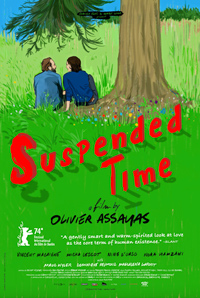Time Regained: Assayas Agonizes in Pretentious Pandemic Reflection
 In what stands as evidence of a surprising lack of self-awareness, director Olivier Assayas reenacts a composite of his familial experiences during the early days of the COVID-19 pandemic with Suspended Time (Hors du Temps). A quartet of people, including two brothers and their new romantic partners, grapple with the new reality of social distancing, masking, and politically correct online shopping options. They have the luxury of reconnecting with their shared past as they spend time at their rural family home, meanwhile engaged in various squabbles born from their cooped up status during an otherwise lovely summer. Various snatches of narration introduce the prized objects once beloved by their deceased parents, while online therapy sessions and aerobic classes via Zoom break up their monotony. Stagnation and lethargy set in, and so a laborious film unspools focusing on the banal routines of the privileged, reflecting how out of touch the purpose and sentiments of this film really are.
In what stands as evidence of a surprising lack of self-awareness, director Olivier Assayas reenacts a composite of his familial experiences during the early days of the COVID-19 pandemic with Suspended Time (Hors du Temps). A quartet of people, including two brothers and their new romantic partners, grapple with the new reality of social distancing, masking, and politically correct online shopping options. They have the luxury of reconnecting with their shared past as they spend time at their rural family home, meanwhile engaged in various squabbles born from their cooped up status during an otherwise lovely summer. Various snatches of narration introduce the prized objects once beloved by their deceased parents, while online therapy sessions and aerobic classes via Zoom break up their monotony. Stagnation and lethargy set in, and so a laborious film unspools focusing on the banal routines of the privileged, reflecting how out of touch the purpose and sentiments of this film really are.
April, 2020. Paul (Vincent Macaigne), a noted film director, and his music journalist brother Etienne (Micha Lescot) return to their family home in Montabe as a global quarantine unfolds. They’re joined by Paul’s new girlfriend, documentarian Morgane (Nine d’Urso) and Etienne’s new girlfriend Carole (Nora Hamazawi). Both men are divorced and have children with their previous wives. Paul’s ex, Flavia (Maud Wyler), makes frequent appearances on FaceTime to berate him about his lackadaisical approach towards their kid’s love of Netflix (and if this is a composite of Mia Hansen-Love, it’s not a flattering one). Together, the quartet drink wine and smoke cigarettes, argue about disinfecting groceries, and watching films too loud late at night.

It’s as if Assayas desired to reclaim the time stolen from him (and all of us) by utilizing these weeks and months as creative impetus, the germination for a cinematic time capsule. However, one assumes the nature of hindsight would have yielded something far more lucrative than endlessly repetitive and quite taxingly dull conversations. It would appear the semi autobiographical elements are incredibly prominent, seeing as Paul is a noted filmmaker who’s worked with Kristen Stewart, etc. Likewise, the film is tonally related to Assayas’ 2008 title Summer Hours, where siblings gripe over the sale of a shared inherited summer home they never use and aren’t quite emotionally capable of letting go. But we learn little beyond the superficial tendencies of these characters, lost as they become in lengthy conversations about literature, music, inspiration and shared memories.
Arguably, it’s not a particularly cherished time for audiences to collectively revisit, and the obnoxious attempts at Assayas to prove his merits as having ‘done the right thing’ by strictly adhering to the fluctuating protocols during the early days of the pandemic result in a queasy, patronizing endeavor. There’s some exploration of how media influenced a potential neurosis in those deemed most ‘germaphobic,’ as evidenced by the prickly exchanges with a supposedly more amiable younger brother.
As Assayas’ alter ego, Macaigne falters under the impossible burden of making any of these exchanges worthwhile. We wait impatiently for a moment of relevance to transpire, for the siblings to finally tap into the existential pondering suggested by the narration. The women are even worse off, all forced smiles and bland pleasantries. Carole not being able to eat gluten and having to contend with Etienne’s penchant for making crepes is the height of the nonbiological drama. Though it’s experimental in form, Bertrand Bonello presented something more profound with Coma (2022), an attempt to convey a similar regurgitation of reflections and psychological processing of this period. Assayas assails us with a vehemently ponderous exercise in which those who experience it are unwittingly giving up their own time to satisfy the self-indulgent whims of his.
Reviewed on February 17th at the 2024 Berlin International Film Festival – Main Competition section. 105 mins.
★/☆☆☆☆☆


